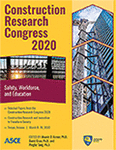Construction Research Congress 2020
Exploring the Association among Dimensions of Safety Climate and Learning Organization Climate
Publication: Construction Research Congress 2020: Safety, Workforce, and Education
ABSTRACT
The development of both a good safety climate and a strong learning climate have been espoused as desirable for construction organizations. However, while safety climate research in construction has seen much attention in recent years, learning climates have been examined mostly in a wider context and relatively rarely within construction. As learning organization initiatives are implemented in construction, it is important to understand how the dimensions of learning organization climate may synergize with dimensions of safety climate. The aim of this study is to explore whether these dimensions are complementary or discordant in a construction context. Using a thematic comparison method, climate dimensions identified in previous literature are compared with themes taken from survey questions used to measure both safety and learning organization climate. The outcomes provide insights gained from the theoretical linkages between the dimensions. These findings can be used both to enable industry to better develop formal processes for organizational learning from safety events and implement general learning organization initiatives into the industry without compromising safety.
Get full access to this article
View all available purchase options and get full access to this chapter.
REFERENCES
Alruqi, W. M., Hallowell, M. R., and Techera, U. (2018). “Safety climate dimensions and their relationship to construction safety performance: A meta-analytic review.” Safety Science, 109(June), 165–173.
Anders, Örtenblad. (2001). “On differences between organizational learning and learning organization.” The Learning Organization, 8(3), 125–133.
Argote, L. (2011). “Organizational learning research: Past, present and future.” Management Learning, 42(4), 439–446.
Buehler, M., Buffet, P. P., and Castagnino, S. (2018). “The Fourth Industrial Revolution is about to hit the construction industry. Here’s how it can thrive | World Economic Forum.”
Cannon, M. D., and Edmondson, A. C. (2005). “Failing to Learn and Learning to Fail (Intelligently): How Great Organizations Put Failure to Work to Innovate and Improve.” Long Range Planning, 38, 299–319.
Choudhry, R. M., Fang, D., and Mohamed, S. (2007). “Developing a Model of Construction Safety Culture.” Journal of Management in Engineering, 23(4), 207–212.
Dekker, S. (2012). Just culture: Balancing safety and accountability. London: CRC Press.
Easterby-Smith, M., Crossan, M., and Nicolini, D. (2000). “Organizational Learning: Debates Past, Present and Future.” Journal of Management Studies, 37(6).
Ekvall, G. (1996). “Organizational climate for creativity and innovation.” European Journal of Work and Organizational Psychology, 5(1), 105–123.
Fiol, C. M., and Lyles, M. A. (1985). “Organizational Learning.” Academy of Management Review, 10(4), 803–813.
Garvin, D. A., Edmondson, A. C., and Gino, F. (2008). “Is Yours a Learning Organization?” Harvard Business Review, March.
Hallowell, M. R., Hinze, J. W., Baud, K. C., and Wehle, A. (2013). “Proactive Construction Safety Control: Measuring, Monitoring, and Responding to Safety Leading Indicators.” Journal of Construction Engineering and Management, 139(10).
J-P, Tixier A., Hallowell, M. R., Albert, A., van Boven, L., and Kleiner, B. M. (2014). “Psychological Antecedents of Risk-Taking Behavior in Construction.” Journal of Construction Engineering and Management, 140(11).
Kululanga, G. K., Price, A. D. F., and McCaffer, R. (2002). “Empirical Investigation of Construction Contractors’ Organizational Learning.” Journal of Construction Engineering and Management, 128(5), 385–391.
Littlejohn, A., Margaryan, A., Vojt, G., and Lukic, D. (2017). “Learning from Incidents Questionnaire (LFIQ): The validation of an instrument designed to measure the quality of learning from incidents in organisations.” Safety Science, 99, 80–93.
Man, S. S., Chan, A. H. S., and Wong, H. M. (2017). “Risk-taking behaviors of Hong Kong construction workers-A thematic study.” Safety Science, 98, 25–36.
Marsick, V., and Watkins, K. E. (2003). “Demonstrating the value of a Organizational Learning Culture: The Dimensions of the Learning Organization.” Advances in Developing Human Resources, 5(2), 132–151.
Mohamed, S. (2002). “Safety Climate in Construction Site Environments.” Journal of Construction Engineering and Management, 128(5), 375–384.
Neal, A., Griün, M. A., and Hart, P. M. (2000). “The impact of organizational climate on safety climate and individual behavior.” Safety Science, 34, 99–109.
Nicholson, N., Soane, E., Fenton-O’Creevy, M., and Willman, P. (2005). “Personality and domain-specific risk taking.” Journal of Risk Research, 8(2), 157–176.
Nikolova, I., Van Ruysseveldt, J., De Witte, H., and Van Dam, K. (2014). “Learning climate scale: Construction, reliability and initial validity evidence.” Journal of Vocational Behavior, 85(3), 258–265.
Oswald, D., Sherratt, F., and Smith, S. (2019). “Managing production pressures through dangerous informality: a case study.” Engineering, Construction and Architectural Management, ECAM-11-2018-0475.
Popova-Nowak, I. V, and Cseh, M. (2015). “The Meaning of Organizational Learning: A Meta-Paradigm Perspective.” Human Resource Development Review, 14(3), 299–331.
Schwatka, N. V., Hecker, S., and Goldenhar, L. M. (2016). “Defining and measuring safety climate: A review of the construction industry literature.” Annals of Occupational Hygiene, 60(5), 537–550.
Waller, K. (2019). “A collective drive to transform construction.” Blog.Gov.Uk, Retrieved from: https://innovateuk.blog.gov.uk/201.
Information & Authors
Information
Published In
Construction Research Congress 2020: Safety, Workforce, and Education
Pages: 375 - 384
Editors: Mounir El Asmar, Ph.D., Arizona State University, David Grau, Ph.D., Arizona State University, and Pingbo Tang, Ph.D., Arizona State University
ISBN (Online): 978-0-7844-8287-2
Copyright
© 2020 American Society of Civil Engineers.
History
Published online: Nov 9, 2020
Published in print: Nov 9, 2020
Authors
Metrics & Citations
Metrics
Citations
Download citation
If you have the appropriate software installed, you can download article citation data to the citation manager of your choice. Simply select your manager software from the list below and click Download.
